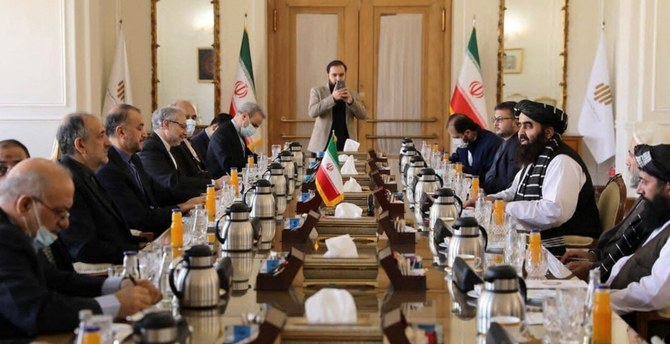KABUL: Landlocked Afghanistan is setting its sights on the Iranian port of Chabahar for access to international markets, giving up on another neighbor, Pakistan, as its main trade route.
The Taliban administration in Kabul announced in late February a $35 million investment in the southern Iranian port, which next to Pakistan’s Gwadar and Karachi is for Afghanistan the closest access point to the Indian Ocean.
“Chabahar port is a vital point in trade and relations between Iran and Afghanistan and plays an important role in the development of economic, trade, and cultural cooperation between the two neighboring countries,” Abdul Salam Jawad Akhundzada, spokesperson of the Taliban-run Ministry of Industry and Commerce, told Arab News.
Iran does not officially recognize the Taliban administration in Kabul, but has sustained commercial and trade ties, in which Chabahar can become a vital feature.
The Taliban are hopeful it would help revive the economy that has been reeling under international sanctions since mid-2021 when they took power as US-led forces left Afghanistan after two decades of war.
“Afghanistan can use the Chabahar port for exports of agricultural products, foods, and industrial raw materials, while using it for transit for goods to and from neighboring countries and the wider region,” Akhundzada said.
“The use of this port can develop the transportation industry in Afghanistan. This includes the development of transportation infrastructure, increasing the efficiency and quality of transportation services, and increasing the ability to transit goods to other countries. Also, the use of Chabahar port can help attract foreign and domestic investment in various industries.”
The Taliban administration’s interest in Chabahar comes amid tensions with Pakistani authorities. The administration in Kabul has been accusing Pakistan of granting access to its port of Karachi as a political leverage.
“Most of our exports and imports were previously through Karachi port. Depending on a country that has been heavily involved in Afghanistan’s affairs in such a critical area was not the right thing for Afghanistan, particularly that the economy of the other country is closely tied with politics,” a close aide of Mullah Abdul Ghani Baradar Akhund, the deputy prime minister for economic affairs, told Arab News.
Relying on Karachi has also become more costly, due to various duties slapped on Afghan traders by Pakistani authorities. The turn to Chabahar would also reshape Afghanistan’s economic relations in the region, as India — Pakistan’s arch-rival — is one of the main investors in the port’s development.
“Pakistan increased the taxes on export, frequently delayed Afghan traders’ goods in the entry points, and regularly imposed fines on Afghan traders causing damage to their business,” Shafiqullah Elhami, former economic adviser to the Afghan presidential office, said.
“The shift from Karachi to Chabahar will mean that Iran becomes the first economic partner with Afghanistan’s market, preceding Pakistan. Chabahar will also increase India’s presence in the Afghan market, also in regional politics.”


























